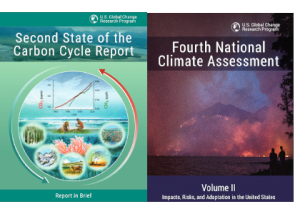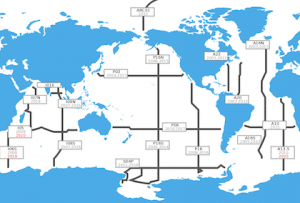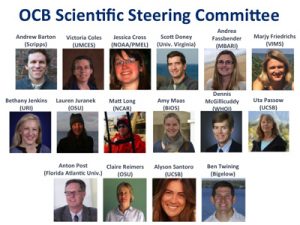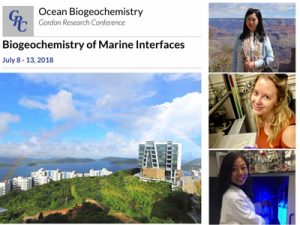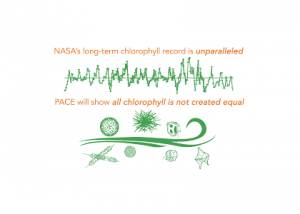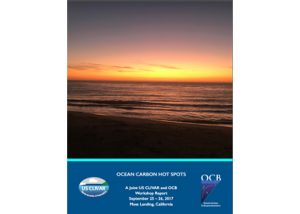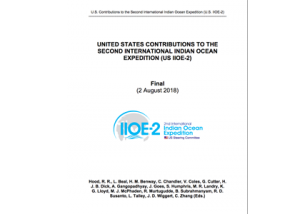The US Ocean Carbon and Biogeochemistry (OCB) Program hosted a two-day workshop December 8-9, 2018 in Washington, DC on Ocean Carbon Uptake in CMIP6 Models: Synthesis and Intercomparison. The international Coupled Model Intercomparison Project (CMIP), now in its 6th incarnation, is generating a wealth of new global numerical simulations that will be available as a […]
Read MoreCommunity review of the IPCC special report The Ocean and Cryosphere in a Changing Climate is open until December 19. Click here to visit USGCRP site to access the document and submit comments. Reviewers can also submit comments directly on the IPCC website. The process is explained in a Federal Register announcement here. Reviews on Chapter […]
Read MoreThe Second State of the Carbon Cycle Report (SOCCR2) was released by the U.S. Global Change Research Program (USGCRP) on November 23. Individual chapter PDFs can be downloaded here. Incorporating 19 chapters distributed across four interconnected sections (I. Synthesis, II. Human Dimensions of the Carbon Cycle, III. State of Air, Land, and Water, IV. Consequences and […]
Read MoreOn behalf of an external review committee, we invite you to participate in a survey of the US GO-SHIP program. US GO-SHIP is an affiliate of international GO-SHIP, which performs global ship-based decadal surveys to collect, document, and store high precision and full depth hydrographic and biogeochemical data from the global ocean. The US CLIVAR […]
Read MoreThe following SSC members are scheduled to rotate off at the end of 2018: Dennis McGillicuddy (WHOI) – physical-biological interactions in the open ocean and coastal margins, mesoscale dynamics, biogeochemical cycling, zooplankton population dynamics Anton Post (FAU) – biology of algae and its ecology, evolution and genomics Andrew Barton (SIO) – marine ecosystem tipping points, […]
Read More2019 OCB Activity Solicitation The Ocean Carbon and Biogeochemistry (OCB) Program is soliciting proposals for OCB activities that will take place or begin during the 2019 calendar year. We seek proposals for OCB-relevant workshops and activities….Read More
Read MoreBeatriz Dias is a Ph.D. candidate at the University of Massachusetts Amherst, Department of Environmental Conservation. Her work includes developing models to aid management decision making in Northeast US large marine ecosystem and Northern Brazil. Her work includes exploring different fisheries management scenarios effects on marine food webs and identifying monitoring priority areas for species of […]
Read MoreDr. Qian (Lydia) Li is a postdoc researcher at the Center for Microbial Oceanography: Research and Education (C-MORE) of University of Hawaiʻi at Mānoa. She received her PhD at Xiamen University (China) and spent one year as a postdoc at the University of Amsterdam before joining Steward’s lab at C-MORE. Her research interests focus on […]
Read MoreThis workshop was held August 21-23, 2018 at the USGS Woods Hole Coastal and Marine Science Center, and brought together 28 researchers from 15 institutions to refine conceptual models of tidal exchange in coastal wetlands, with focus on dissolved organic and inorganic carbon, particulate carbon, and sediment. The group engaged in discussion of concentration and […]
Read MoreOCB recently approved a travel support request to provide travel stipends to help offset the costs for U.S.-based postdocs to attend the 2019 SOLAS Open Science Conference (April 21-25, 2019, Sapporo, Japan). OCB is seeking applications from interested U.S.-based postdocs who require financial assistance in order to attend the conference. Travel stipend recipients will be […]
Read MoreGreetings from the NASA Plankton, Aerosol, Cloud, ocean Ecosystem (PACE) Project at Goddard Space Flight Center (GSFC). Scheduled for launch in late 2022, PACE is a strategic climate continuity activity that will not only extend key heritage ocean color, cloud, and aerosol data records, but also promises to enable new insight into oceanographic, biological, and […]
Read MoreWestern boundary current (WBC) regions display the largest magnitude air-to-sea carbon dioxide (CO2) fluxes of anywhere in the global ocean, exhibit large spring blooms and high eddy activity, and are hubs for the subduction of anthropogenic carbon-laden waters into the ocean interior during mode water formation. Yet the influence of biophysical interactions on air-sea CO2 […]
Read MoreNathalí Cordero-Quirós is a 3rd year PhD student in Climate Sciences at Scripps Institution of Oceanography. Advised by Dr. Arthur Miller, her current research focuses on the effects of El Niño Southern Oscillation over the physical state and biogeochemistry of the California Current System. She uses coupled climate models to evaluate the predictability of the […]
Read MoreNew report published on U.S. contributions to the 2nd International Indian Ocean Expedition (IIOE-2)
A new report entitled United States Contributions to the Second International Indian Ocean Expedition (U.S. IIOE-2) summarizes discussions that took place during an Indian Ocean community workshop co-sponsored by OCB in September 2017 (La Jolla, CA). The purpose of this document is to motivate and coordinate U.S. participation in IIOE-2 by outlining a core set […]
Read MoreGordon Research Conference on Ocean Biogeochemistry Hong Kong University of Sciences and Technology – July 8 to 13, 2018 Summary Report* Louis Legendre (France) and Sylvia Sander (Monaco), Chairs Chuanlun Zhang (China) and Susanne Neuer (USA), Vice Chairs Location, dates, and program: The second Gordon Research Conference (GRC) on Ocean Biogeochemistry was held at the […]
Read More


